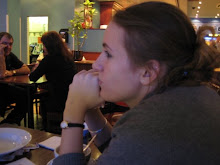"And I trust for him that everything he is doing has to be done. This is our life."
My brother and I watched Into the Wild last night. It's a movie that makes one long for life, and the courage with which to really live. Since the movie first came out, I've been a little afraid to see it. Afraid of the ending I knew was coming; afraid of the sorrow and loss. But this isn't a movie about death, it's a movie about life. About truly experiencing the moments we're given. So that even at the end, when a 23-year-old boy dies alone in a bus in the middle of the Alaskan wilderness, it's hard to experience anything other than joy. Joy and longing. And maybe pain for the people he left behind.
When Chris/Alex finds the "magic" bus, near the start of the film, I was overwhelmed by the sense of what G.K. Chesterton calls treasure. The experience of being a castaway on an island where a shipwreck washes up, and every ordinary, every-day item becomes something precious to be cherished, rather than scorned. In his book Orthodoxy, Chesterton speaks of loving Robinson Crusoe for this reason, because it reminds him of the true nature of life -- that everything is treasure. And I long for that right sense of things and their worth -- a worth that only seems graspable when one owns nothing, and therefore has nothing to lose and everything to gain. The delight that sees the world as precious.
It's a truth I knew well as a child, when torn pieces of cloth, abandoned on the sidewalk, could hold my imagination for hours.
The hardest part of the film for me to reconcile is the story of a sister left behind. She says, in one of her many moments of narration, that unlike her parents, who have been purposefully cast off, she receives no word because he knows she doesn't need it. He knows she loves him enough, and is certain enough in his love, to live on in his absence.
Is that the great secret of existence, in this world of separation and loss? The great test of truth? That there are relationships that flounder and die with distance, but real love, as Charles Williams might argue, knows no limits of space or time? Ruth Haley Barton, in her book Sacred Rhythms, says that the life-giving significance of solitude is that it allows us to experience the reality that all things "irreconcilable are somehow reconciled through Christ. Everything is already one through the person and work of Christ in the timelessness that is God." Ultimately, God holds the presence of those we love within God's self, and when we are with God, the perfect Wholeness, separation is impossible. This may seem like spiritualist mumbo-jumbo, but I think the opposite may be true -- that it is simply spiritual truth, that we are often too earthbound, and transient, to experience. But when we live truly, and cease sheltering ourselves from the present moment and the God who indwells it, I think all physical boundaries must burst.


No comments:
Post a Comment